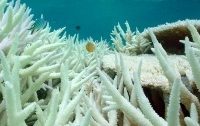
Coral reefs are so fundamentally damaged by climate change that decades of research on how to protect them may not even still be applicable, scientists say. In a study of coral over 20 years, UK scientists found that a warming climate undoes decades of knowledge on coral in protected areas, known as marine reserves. These delicate and vital ecosystems have been used as a guide to rejuvenate biodiversity in other disrupted regions.
However, tropical coral reef marine reserves can offer little defence in the face of climate change impacts, meaning conservationists may have to ‘rethink their role’.
The team is calling for urgent reductions in global greenhouse gas emissions and poor land practices that leak pollutants into coastal waters, to protect coral reefs.
‘Climate change is so fundamentally changing the structure and composition of coral reef ecosystems, that the way the ecosystem functions and responds to common management and conservation approaches needs to be carefully re-evaluated,’ said Professor Nick Graham at Lancaster University.
‘The rules we have come to rely on, no longer apply.’
Coral bleaching occurs when seas become too warm, causing corals to shed colourful algae.
As ocean temperatures rise, warmer waters stress corals, causing them to release algae that live inside them, which gives them up to 90 per cent of their energy.
This event causes the vibrantly-coloured communities of coral to turn white – an effect called coral bleaching.
Bleached corals are not dead, but are at a higher risk of dying, and these bleaching events become more common under climate change.
While some coral reefs are able to recover over time, others become dominated by seaweed.
Over the years, repeated coral bleaching due to warming seas causes disruption to marine ecosystems around the world.
This reduces the availability of food and shelter for many marine species that rely on these coral structures, resulting in biodiversity losses.
For their study, University of Lancaster scientists focused on coral reef marine reserves in Seychelles – an island nation off the east coast of Africa in the Indian Ocean.
Seychelles coral reefs were affected by a bleaching event in 1998, when around 90 per cent of the coral in surrounding waters died.
Scientists used data from 21 reefs spanning more than two decades to examine how reefs have changed over time and how it has affected the role of marine reserves.
Marine reserves have been used for decades to enhance biodiversity and fish biomass by preventing damage and over-exploitation by fishing.
‘Our long-term records of Seychelles’ coral reefs show that before the bleaching event marine reserves contained high coral cover, a very biodiverse range of fish, and high biomass of carnivorous and herbivorous fish,’ said Professor Graham, lead author of the study.
‘Following the bleaching event, the role of the marine reserves changed substantially.
‘They no longer supported higher coral cover compared to adjacent fished areas, and their role in enhancing biodiversity decreased.’
Plant-loving fish, such as rabbitfish and parrotfish, dominated fish communities after the bleaching event.
Both feed on algae and so increase in numbers when reefs shift to algae.
Marine reserves have not been as effective at protecting carnivorous predators, such as grouper and snapper species, which are near the top of the food chain.
The researchers attribute the predator population drop of such species to less prey being available following the loss of coral reef structures.
‘Other fish, such as groupers and snappers, decline as their prey – small fish – disappear when the live coral habitat goes,’ Professor Graham said.
However, the experts added that despite these climate-driven changes, the protected areas still have a role to play in ocean conservation.
‘Although these reordered marine reserves are less biodiverse, they are still important to maintain,’ said Gilberte Gendron of the Seychelles National Parks Authority, who co-authored the research paper.
‘This is because, when compared to openly fished areas, they still protect higher levels of fish biomass of species that are important to our local fisheries.
‘For example, the protected herbivorous fish can spill out into openly fished areas and help support adjacent fisheries.’
The research team, compromised of University of Lancaster, Seychelles Fishing Authority and University of Western Australia scientists, have said new marine reserves may need to be created around coral reefs where warming rates are slowest or where recovery from bleaching is more likely.
The study has been published in the journal Nature Communications.











Social Profiles